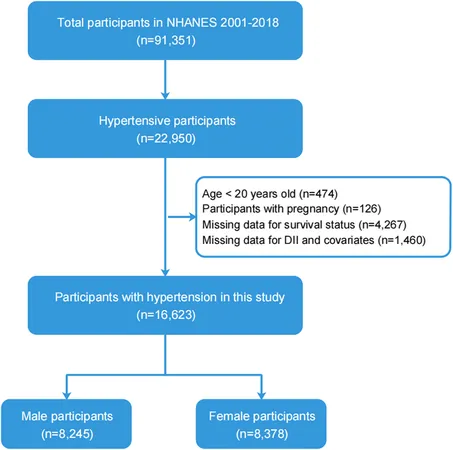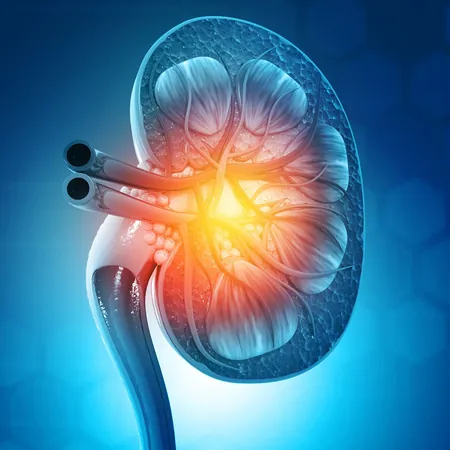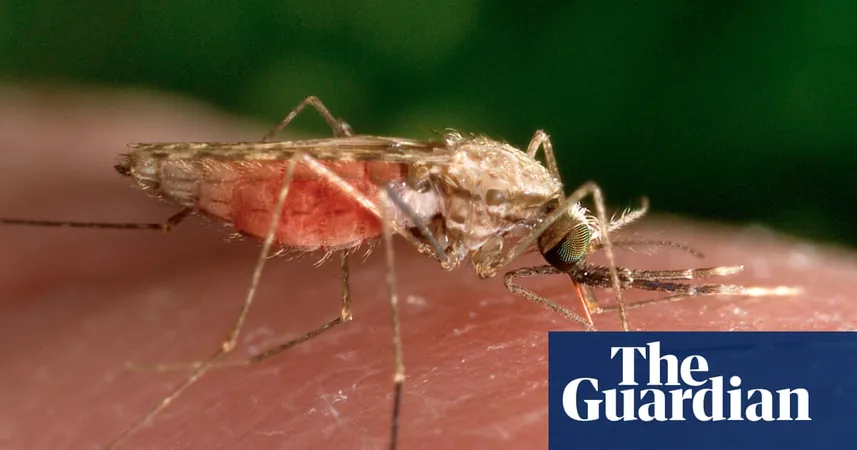
Unlocking the Secrets of Diet: How Inflammation Influences Mortality Rates in Hypertensive Adults
2025-06-03
Author: Daniel
Understanding the Diet-Health Connection
A groundbreaking study reveals surprising insights into how dietary inflammation affects cardiovascular (CV) and non-cardiovascular mortality among hypertensive adults. By analyzing data from the comprehensive NHANES survey, researchers have identified critical associations that could reshape dietary recommendations for individuals dealing with hypertension.
Who Participated in the Study?
The study evaluated a substantial sample of 16,623 hypertensive individuals from the NHANES database, encompassing both sexes (50.4% females). Participants were carefully screened based on self-reported diagnoses of hypertension and other clinical criteria, ensuring robust data representation.
What is the Dietary Inflammatory Index (DII)?
The researchers adapted a refined version of the Dietary Inflammatory Index (DII) to gauge the inflammatory potential of participants' diets. This streamlined method utilizes 27 dietary factors, allowing for a comprehensive assessment of how what we eat may influence inflammation levels and health outcomes.
The Connection Between Diet and Mortality Risks
Pronounced differences in mortality rates emerged based on DII scores, suggesting a strong correlation between diet and life expectancy in hypertensive patients. Those with higher DII scores were found to face a 36% increased risk of cardiovascular death, with striking implications specifically for women.
Gender-Specific Findings Uncovered
The study unveiled notable gender differences. Women with high dietary inflammation scores had a staggering 54% greater chance of CV mortality, while men did not exhibit statistically significant risk increases. This disparity highlights the need for gender-sensitive approaches in managing hypertension.
What Factors Exacerbate the Risks?
Several factors contribute to the observed differences, including compliance with treatment among hypertensive individuals, the role of socioeconomic status, and reproductive health dynamics. Women tend to have distinct physiological responses to dietary inflammation, which can elevate their cardiovascular risks.
Exploring Non-CV Mortality Risks
The researchers also looked into non-cardiovascular mortality, establishing that higher DII scores correlated with an increased risk of death from various conditions, including diabetes and respiratory diseases. This illumination of diet’s broader impact on general health underpins the need for further inquiry.
Implications for Future Research and Health Guidelines
Despite its limitations, this study emphasizes the urgent need for personalized dietary recommendations, particularly for women with hypertension. As researchers continue to unravel the pathways between diet and health outcomes, this research lays the groundwork for more effective, tailored interventions.
Conclusion: Eating for Life
These compelling findings enforce the notion that dietary choices can be a matter of life and death. Eating a diet rich in anti-inflammatory foods, such as fruits and vegetables, could potentially stave off hypertension-related risks and enhance overall health. Moving forward, embracing a holistic approach that considers both gender and diet will be crucial in reducing mortality risks among hypertensive populations.



 Brasil (PT)
Brasil (PT)
 Canada (EN)
Canada (EN)
 Chile (ES)
Chile (ES)
 Česko (CS)
Česko (CS)
 대한민국 (KO)
대한민국 (KO)
 España (ES)
España (ES)
 France (FR)
France (FR)
 Hong Kong (EN)
Hong Kong (EN)
 Italia (IT)
Italia (IT)
 日本 (JA)
日本 (JA)
 Magyarország (HU)
Magyarország (HU)
 Norge (NO)
Norge (NO)
 Polska (PL)
Polska (PL)
 Schweiz (DE)
Schweiz (DE)
 Singapore (EN)
Singapore (EN)
 Sverige (SV)
Sverige (SV)
 Suomi (FI)
Suomi (FI)
 Türkiye (TR)
Türkiye (TR)
 الإمارات العربية المتحدة (AR)
الإمارات العربية المتحدة (AR)